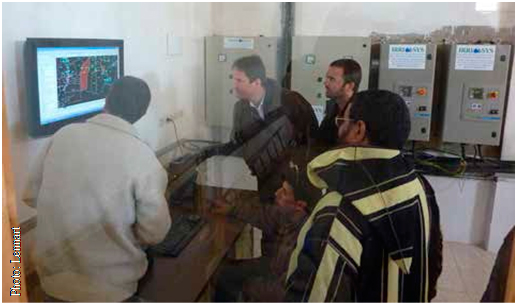Click here to register!
Difference between revisions of "SPIS Toolbox - Credit Policy: Select/develop Suitable Financial Instruments"
From energypedia
***** (***** | *****) m |
***** (***** | *****) m |
||
| Line 38: | Line 38: | ||
'''Note: '''SPIS clients could become future clients forother financial products (cross selling). | '''Note: '''SPIS clients could become future clients forother financial products (cross selling). | ||
| + | |||
[[File:Automated-irrigation-S.jpg|thumb|center|600px|Automated irrigation system in Morocco – largely subsidized by the state.]] | [[File:Automated-irrigation-S.jpg|thumb|center|600px|Automated irrigation system in Morocco – largely subsidized by the state.]] | ||
| + | [[Category:Tools]] | ||
| + | [[Category:Powering_Agriculture]] | ||
[[Category:SPIS_Module]] | [[Category:SPIS_Module]] | ||
| − | |||
| − | |||
Revision as of 19:30, 12 May 2017
Credit Policy: Select/Develop Suitable Financial Instruments
When selecting or developing a loan product for SPIS it is important to ask the following questions:
- who? Market oriented producers, no subsistence production, producer groups possible;
- what? Finance for energy source and pumping system used for irrigation; energy and/or water saving technology;
- how much? Establish range of loan sum; % own-contribution of producer; % subsidy;
- when? Range of loan period (years); repayment frequency (months); disbursement in tranches;
- interest rate? From..x..% p.a. to ..x..% p.a. (range);
- collateral? Equipment, mortgages, additional collateral (guarantee scheme), non-traditional collateral (future harvest, warehouse), leasing scheme with equipment providers.
Loan products for financing SPIS usually:
- have higher initial investment sums with consequently longer repayment periods and/or high installment rates;
- need alternative guarantee schemes/ unconventional collateral;
- have higher interest rate payments due to higher credit risk and long investment period;
- focus on innovative clients, usually investing in high(er) value crops;
- should be strictly oriented towards water capacity available and the farm’s specific requirements;
- use no blueprint; every farm/enterprise is unique!
In order to prevent prohibitive loan transaction costs, consider:
- guarantee funds with public support or insurance;
- leasing schemes with pumping system providers and others;
- group financing approaches for producer groups;
- public subsidies and sponsoring;
- favorable re-financing options for the financial institution (e.g. subsidized interest rates offered by donors/public entities).
In order to overcome the information gap in respect of the new technology, introduce additional activities such as:
- encouraging (potential) clients to get informed and consult technical advice;
- training and sensitization of loan staff on basics about the technology;
- monitoring loan performance closely;
- continuous dialogue with solar power sector.
Note: SPIS clients could become future clients forother financial products (cross selling).




















